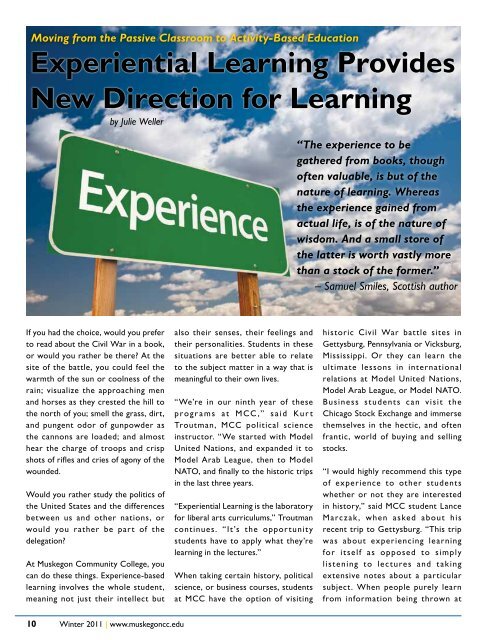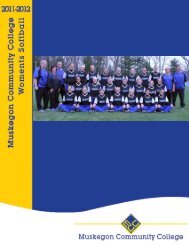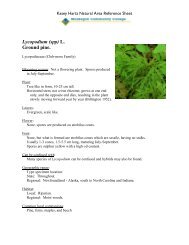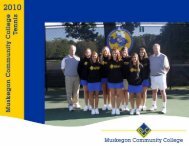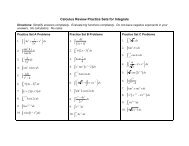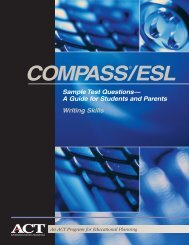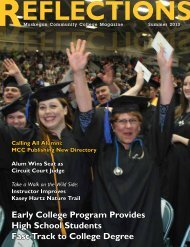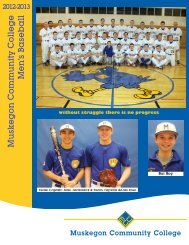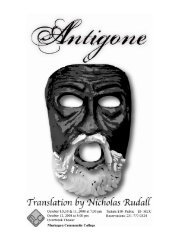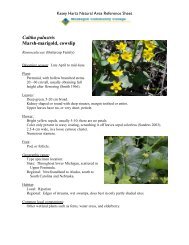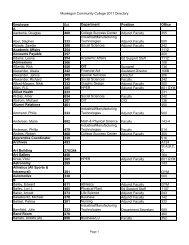Winter 2011 - Muskegon Community College
Winter 2011 - Muskegon Community College
Winter 2011 - Muskegon Community College
You also want an ePaper? Increase the reach of your titles
YUMPU automatically turns print PDFs into web optimized ePapers that Google loves.
Moving from the Passive Classroom to Activity-Based Education<br />
Experiential Learning Provides<br />
New Direction for Learning<br />
by Julie Weller<br />
“The experience to be<br />
gathered from books, though<br />
often valuable, is but of the<br />
nature of learning. Whereas<br />
the experience gained from<br />
actual life, is of the nature of<br />
wisdom. And a small store of<br />
the latter is worth vastly more<br />
than a stock of the former.”<br />
– Samuel Smiles, Scottish author<br />
If you had the choice, would you prefer<br />
to read about the Civil War in a book,<br />
or would you rather be there At the<br />
site of the battle, you could feel the<br />
warmth of the sun or coolness of the<br />
rain; visualize the approaching men<br />
and horses as they crested the hill to<br />
the north of you; smell the grass, dirt,<br />
and pungent odor of gunpowder as<br />
the cannons are loaded; and almost<br />
hear the charge of troops and crisp<br />
shots of rifles and cries of agony of the<br />
wounded.<br />
Would you rather study the politics of<br />
the United States and the differences<br />
between us and other nations, or<br />
would you rather be part of the<br />
delegation<br />
At <strong>Muskegon</strong> <strong>Community</strong> <strong>College</strong>, you<br />
can do these things. Experience-based<br />
learning involves the whole student,<br />
meaning not just their intellect but<br />
also their senses, their feelings and<br />
their personalities. Students in these<br />
situations are better able to relate<br />
to the subject matter in a way that is<br />
meaningful to their own lives.<br />
“We’re in our ninth year of these<br />
p rogr a m s at M CC ,” s a i d Ku r t<br />
Troutman, MCC political science<br />
instructor. “We started with Model<br />
United Nations, and expanded it to<br />
Model Arab League, then to Model<br />
NATO, and finally to the historic trips<br />
in the last three years.<br />
“Experiential Learning is the laboratory<br />
for liberal arts curriculums,” Troutman<br />
continues. “It’s the oppor tunity<br />
students have to apply what they’re<br />
learning in the lectures.”<br />
When taking certain history, political<br />
science, or business courses, students<br />
at MCC have the option of visiting<br />
historic Civil War battle sites in<br />
Gettysburg, Pennsylvania or Vicksburg,<br />
Mississippi. Or they can learn the<br />
ultimate lessons in international<br />
relations at Model United Nations,<br />
Model Arab League, or Model NATO.<br />
Business students can visit the<br />
Chicago Stock Exchange and immerse<br />
themselves in the hectic, and often<br />
frantic, world of buying and selling<br />
stocks.<br />
“I would highly recommend this type<br />
of experience to other students<br />
whether or not they are interested<br />
in history,” said MCC student Lance<br />
Marczak , when asked about his<br />
recent trip to Gettysburg. “This trip<br />
was about experiencing learning<br />
for itself as opposed to simply<br />
listening to lectures and t aking<br />
extensive notes about a particular<br />
subject. When people purely learn<br />
from information being thrown at<br />
10 <strong>Winter</strong> <strong>2011</strong> | www.muskegoncc.edu


